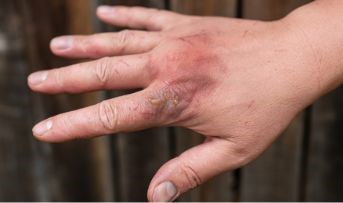Blog Details - Magma HDI

Here are the best tips for administering first aid for burns 2nd January 2023
First-aid tips and techniques have been a part of our educational curriculum since junior school. We all have learned the first-hand treatments one must do when there is a manageable injury or burn on our or someone else’s body. However, with time and as the level of injuries and diseases evolved, our knowledge about first aid falls short in terms of adequacy in the healing process.
Moreover, burns can happen anytime, primarily if operating around heavy machinery, fire, or in the kitchen. And it requires a lot of time to heal with proper care, ointments and medications, and extra precautions.
But what are some of the best ways to take care of these burns? What items should you include in your first aid kit to help you or someone else? Are there different degrees of burns, and which type of burns can first aid easily?
In this space, we’ll clarify all your doubts regarding first aid for burns. Let’s get started.
1. Minor or major:
A burn usually indicates tissue damage when the skin comes in contact with high flames, boiling water, sunburn/radiation, chemicals with corrosive properties, etc. Before starting the burn treatment, it is advised that you determine the degree of the burn to alter your treatment accordingly and determine whether immediate medical attention is needed.
A major burn occurs when the diameter of the burnt area is more than three inches, resulting in brown, black, and white patches with a dry and leather-like texture of the skin. In case of a minor burn, blisters appear on the burnt area, usually less than three inches in diameter. You will experience pain and inflammation, which might cause redness and soreness on the burnt site.
2. What you should NOT do:
Before we tell you the first aid tips you should follow, you need to be aware of the contamination of the sensitive and burnt part of the skin. Avoid using home remedies like butter, ice, water, etc., and immediately do not take any medications or remedies without consultation.
3. Must know first aid tips:
Remove jewellery items like rings, bangles, etc., from the burnt area. Cooling off the burn is essential. You can gently use cold water on the burnt portion and wet compresses to help with the inflammation and lower the pain. If you see any blisters, do not remove or poke them, as they protect the area from infection. If you see a blister pop, gently clean it with a disinfectant solution and cover it with an antibiotic cream. To ensure that the affected area does not dry out, use skin-friendly and chemical-free moisturisers. Aloe vera is a good option in such cases. Use sterile gauze and tapes to bandage the burn, but ensure that you do not tighten the grip of the bandage. Keeping it loose will prevent excessive pressure and alleviate pain.
You can take any doctor-recommended painkillers if the pain gets unbearable and causes too much discomfort. Avoid heavy tasks involving the burnt area, and avoid using fluffy cotton as tiny threads of cotton might stick to the burn risking the chance of an infection.
We hope you found the blog helpful. You must take care of your body and be extra cautious about your health to lead an extraordinary life. But sometimes, your efforts might fall short in unfortunate circumstances. To alleviate the monetary stress of such times, you must purchase the best personal accident insurance India which will provide you and your family with a reliable layer of financial protection.
Click HERE to learn more about the benefits of buying the best personal accident insurance India.
Disclaimer: The information provided above is for illustrative purposes only. To get more details, please refer to policy wordings and prospectus before purchasing a policy.

